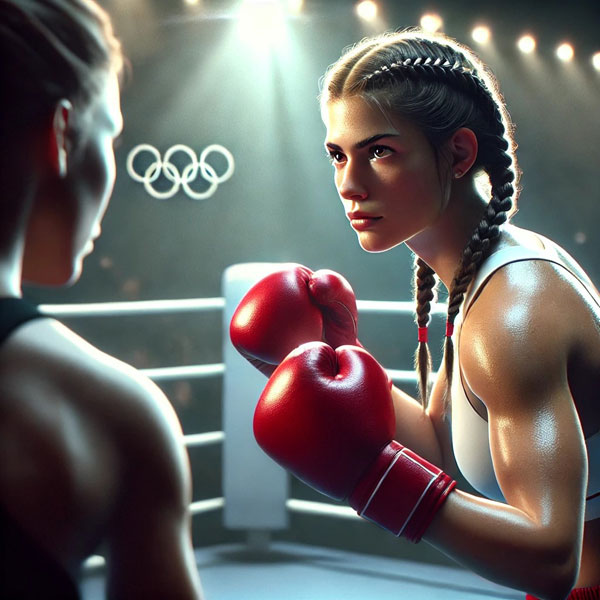The XY chromosome controversy erupts at Olympic boxing event

[The theme of the 2024 Paris Olympics women's boxing event. Photo Credit: OpenAI, DALL·E]
A heated debate over gender eligibility standards resurfaced at the women’s boxing competition on August 3, 2024, when Algerian boxer Imane Khelif and Taiwanese boxer Lin Yu-Ting stepped into the Olympic ring in Paris.
The controversy reached a climax when Khelif won her round of 16 match against Italy’s Angela Carini within 46 seconds, after Carini withdrew citing safety concerns.
Both Khelif and Lin had previously been disqualified for last year’s World Championships by the International Boxing Association (IBA) for non-compliance with gender eligibility standards.
However, their participation in the Olympics was secured through the International Olympic Committee (IOC)’s approval.
At the heart of the controversy lies the fact that both athletes have XY chromosomes and a condition called Differences in Sexual Development (DSD), which typically results in increased testosterone levels.
DSD encompasses approximately 40 conditions affecting genetic, hormonal, and reproductive characteristics, according to medical experts.
The debate echoes controversies in athletics, most notably the case of South African runner Caster Semenya, who was restricted from women’s events due to her naturally high testosterone levels.
Semenya’s legal battle over her right to compete brought international attention to the issue.
The controversy has drawn stark lines between governing bodies.
IBA President, Umar Kremlev maintains that athletes with XY chromosomes should be excluded from competition.
In contrast, the IOC has defended Khelif and Lin's eligibility, citing their lifelong identification as female and their official documentation.
The situation highlights the IOC’s 2021 framework promoting fairness, inclusivity, and non-discrimination based on gender identity and sex variations.
Yet, experts remain divided on the path forward.
While some advocate for a more refined approach considering genetic factors, hormone levels, and physical development, others warn of ethical and privacy concerns.
In a bid to address similar challenges, the UK Athletics Association has proposed an 'open category' for transgender and DSD athletes, though critics argue this may not fully resolve the complex issues at hand.
The 2024 Paris Olympics have concluded, but this debate leaves sports organizations facing mounting pressure to develop comprehensive guidelines that balance fairness and inclusivity, while preserving competitive integrity.
The controversy at these Games has demonstrated that the intersection of gender, biology, and competitive sports stands as one of the most challenging issues facing athletic governing bodies worldwide.

- Aiden Been Jo / Grade 10
- Ssangyong High School

![THE HERALD STUDENT REPORTERS [US]](/assets/images/logo_student_us.png)
![THE HERALD STUDENT REPORTERS [Canada]](/assets/images/logo_student_ca.png)
